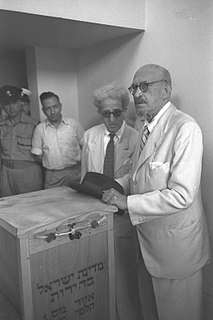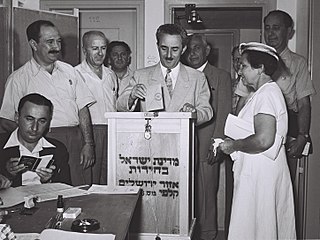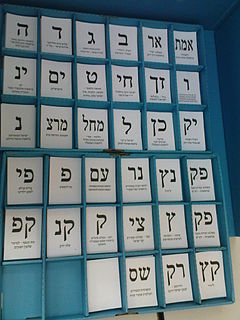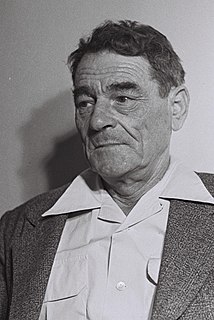Mapai was a centre-left political party in Israel, and was the dominant force in Israeli politics until its merger into the modern-day Israeli Labor Party in 1968. During Mapai's time in office, a wide range of progressive reforms were carried out, as characterised by the establishment of a welfare state, providing minimum income, security, and free access to housing subsidies and health and social services.

The General Zionists were a centre-right Zionist movement and a political party in Israel. The General Zionists supported the leadership of Chaim Weizmann and their views were largely colored by central European culture. Their political arm is an ancestor of the modern-day Likud.
The Progressive Party was a political party in Israel.

Elections for the second Knesset were held in Israel on 30 July 1951. Voter turnout was 75.1%.
The United Religious Front was a political alliance of the four major religious parties in Israel, as well as the Union of Religious Independents, formed to fight the 1949 elections.

Elections for the third Knesset were held in Israel on 26 July 1955. Voter turnout was 82.8%.
Hapoel HaMizrachi was a political party and settlement movement in Israel and is one of the predecessors of the National Religious Party, which later became the modern-day Jewish Home Party.
Poalei Agudat Yisrael was a trade union and Jewish political party in Poland, and was a minor political party in Israel. It was also known as PAI or PAGI, its Hebrew acronym.
Mizrachi was a political party in Israel and is one of the ancestors of the modern-day Jewish Home Party.
Elections for the fifth Knesset were held in Israel on 15 August 1961. Voter turnout was 81.6%.
The Religious Torah Front was a political alliance in Israel composed of Agudat Yisrael and Poalei Agudat Yisrael.
Elections for the sixth Knesset were held in Israel on 2 November 1965. Voter turnout was 85.9%.

Kalman Kahana was a long-serving Israeli politician and journalist, and a signatory of the Israeli declaration of independence. He was the brother of Yitzhak Kahan, former President of the Supreme Court of Israel.

The third government of Israel was formed by David Ben-Gurion on 8 October 1951, more than two months after the elections. His Mapai party formed a coalition with Mizrachi, Hapoel HaMizrachi, Agudat Yisrael, Poalei Agudat Yisrael and the three Israeli Arab parties, the Democratic List for Israeli Arabs, Progress and Work and Agriculture and Development. There were 15 ministers.

The fourth government of Israel was formed by David Ben-Gurion during the second Knesset on 24 December 1952. Ben-Gurion dropped the ultra-orthodox parties Agudat Yisrael and Poalei Agudat Yisrael from his coalition and replaced them with the General Zionists and the Progressive Party, who formed the government together with Mapai, Mizrachi, Hapoel HaMizrachi, the Democratic List for Israeli Arabs, Progress and Work and Agriculture and Development.

The eighth government of Israel was formed by David Ben-Gurion on 7 January 1958, and was the second government of the third Knesset. Ben-Gurion kept the same coalition partners as during the previous government, i.e. Mapai, the National Religious Party, Mapam, Ahdut HaAvoda, the Progressive Party, the Democratic List for Israeli Arabs, Progress and Work and Agriculture and Development. The only change to the cabinet was the addition of Shlomo-Yisrael Ben-Meir as a Deputy Minister.

The tenth government of Israel was formed on 2 November 1961 following the August elections. Although David Ben-Gurion was appointed Prime Minister, the government was actually formed by Minister of Finance, Levi Eshkol. On 7 September Ben-Gurion had told President Yitzhak Ben-Zvi that he was unable to form a government; on 14 September Ben-Zvi asked Eshkol to form a government, with Eshkol subsequently announcing that he would do so with Ben-Gurion as PM. It turned out to be the last government led by Ben-Gurion.

Mordechai Nurock was a Latvian-born Israeli who served in both the parliaments of Latvia and Israel. He was also Israel's first Minister of Postal Services, though he only held the post for just under two months.









